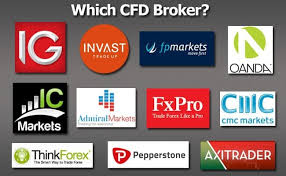
The Best CFD Trading Markets: Where to Trade for Optimal Success
As the world of finance continues to evolve, best cfd trading markets bestbrokercfd.com shines a spotlight on the best CFD trading markets that empower traders to leverage price movements without owning the underlying asset. CFD trading, or Contract for Difference, allows traders to speculate on the rising or falling prices of a wide array of financial instruments. From stocks to commodities and cryptocurrencies, the flexibility of CFD trading opens up numerous opportunities. This article will explore the best CFD trading markets, their characteristics, and how to approach trading in these markets effectively.
Understanding CFD Trading
CFD trading is a popular form of trading that allows you to profit from price movements in financial markets without needing to buy the actual asset. By entering into a contract with a broker, you speculate on whether the price of an asset will rise or fall. If you correctly predict the market movement, you can realize a profit; if not, you incur a loss. As such, it requires a solid understanding of market trends, risk management, and trading strategies.
1. Stock Markets
Stock markets are among the most popular options for CFD trading. Traders can speculate on a wide range of stocks from global exchanges like the NYSE and NASDAQ. The advantage of trading stocks via CFDs is that you can short-sell and use leverage, which can amplify profits but also risks. It’s essential to analyze company earnings, market trends, industry news, and economic indicators for successful stock trading.

2. Forex Markets
The foreign exchange market (Forex) is the largest and most liquid market in the world. It offers vast opportunities for CFD traders due to its 24-hour trading window and the availability of major, minor, and exotic currency pairs. Traders benefit from low costs, tight spreads, and leveraged trading. However, the complexity of currency movements requires a good command of economic factors and geopolitical events.
3. Commodity Markets
Commodities, including precious metals, oil, and agricultural products, provide another fertile ground for CFD trading. Their prices can be influenced by various factors such as supply and demand dynamics, weather conditions, and geopolitical tensions. Gold and oil are particularly popular among traders due to their volatility and historical performance as safe-haven assets during economic uncertainty.
4. Cryptocurrency Markets
The emergence of cryptocurrencies has revolutionized the CFD trading landscape. Digital currencies like Bitcoin, Ethereum, and Litecoin have attracted traders worldwide due to their volatility and high potential returns. Trading cryptocurrencies as CFDs enables traders to capitalize on price fluctuations without owning the coins. The crypto market is less regulated, which entails higher risks but also larger rewards.
5. Index Markets

Indices like the S&P 500, FTSE 100, and NASDAQ provide a way to trade multiple stocks simultaneously through CFDs. They are especially useful for diversifying a trading portfolio. Index trading is less emotional than individual stock trading since it reflects the overall market sentiment rather than a single company’s performance. Understanding macroeconomic factors is essential for success in index trading.
Choosing the Right CFD Broker
To maximize your trading success, selecting the right CFD broker is paramount. Look for a broker that offers a user-friendly platform, competitive spreads, low commissions, and robust trading tools. Additionally, ensure that the broker is regulated by financial authorities, providing assurance and protection for your trading investments.
Risk Management in CFD Trading
Regardless of the market, risk management is crucial in CFD trading. Here are some key strategies:
- Use Stop Loss Orders: These orders help limit losses by automatically closing a trade at a predetermined price.
- Manage Leverage Wisely: While leverage can enhance profits, it can also magnify losses. Understand the implications of leveraging your trades.
- Diversify Your Portfolio: Avoid putting all your capital into one market or asset. Spread your investments across various markets and instruments.
- Keep Emotions in Check: Stick to your trading plan and avoid emotional trading decisions based on fear or greed.
Conclusion
In conclusion, the best CFD trading markets offer unprecedented opportunities for traders willing to navigate the complexities of financial markets. Whether you choose stocks, forex, commodities, cryptocurrencies, or indices, each market has its unique characteristics and opportunities. Success in CFD trading hinges on thorough research, a solid trading strategy, and effective risk management. By keeping abreast of market trends and developments, and utilizing the right tools and resources, traders can position themselves to thrive in this dynamic trading environment.